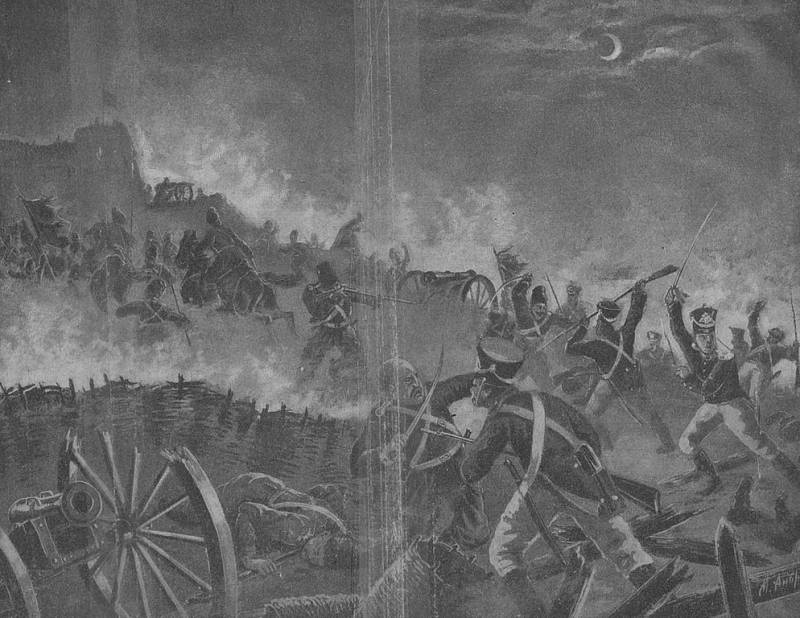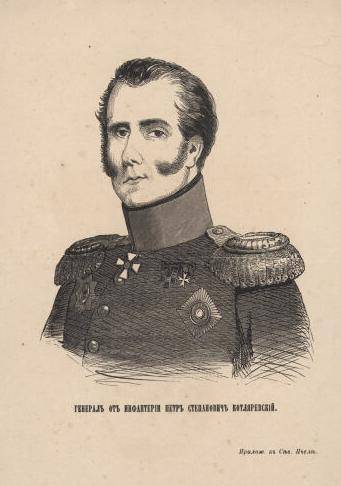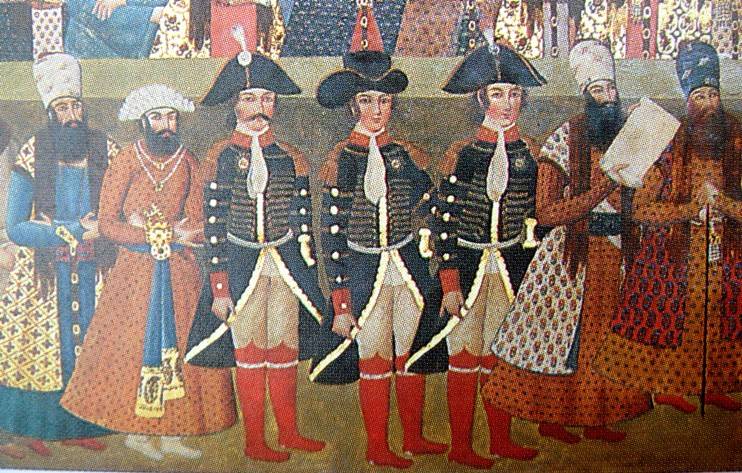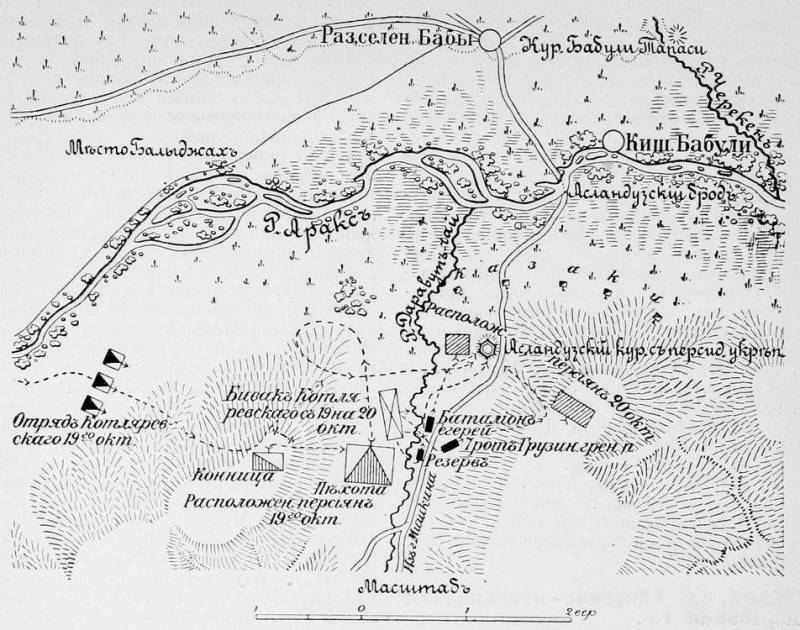"Let's go, brothers, and break it!" How 2 miraculous heroes of Kotlyarevsky crushed the 30th Persian army

Aslandus battle. Rice. M. Andreeva
General situation
The war with Persia has been going on since 1804. Two great powers fought for the future of the Caucasus. Persia sought to stop the successful advance of the Russians in the region, which they considered their fiefdom. The Persians were incited by the British and French.
Russia traditionally acted in the Caucasus with small forces and at the same time maintained order in the newly reconciled country. In addition, she was associated with wars with Turkey and France. In 1805, Russian troops repulsed the Persian invasion of Georgia. The Karabakh, Shirvan and Shchekino khanates, the Shuragel sultanate were annexed to the empire. In 1806, Gudovich conquered Derbent, the whole of Dagestan, the Baku and Cuban khanates. The Persian attack was repulsed.
In 1806, Russia went to war with Turkey and tried to make peace with Persia. England signed an agreement with Persia directed against Russia. The Persian army is reinforced by English officers and advisers. The British help Persia create a modern regular army. In 1808 the fighting continued. The Russian army failed to take Erivan. In 1809, fruitless negotiations were again conducted with the Persians. The war took on a protracted character. Due to insufficient forces, we could not launch a decisive offensive and end the war. Also, they could not fully use their successes.
At the same time, the Russians continued to beat the enemy in small numbers. So, in June 1810, Colonel Pyotr Kotlyarevsky, with one battalion of rangers of the 17th regiment, took the impregnable by nature and heavily armed fortress of Migri. Then the miraculous heroes of Kotlyarevsky destroyed the 10th Persian corps, which was trying to recapture the fortress, with a night attack. The brave and decisive commander was appointed chief of the Caucasian (Georgian) Grenadier Regiment. On December 7, 1810, with a sudden attack, Kotlyarevsky, leading the soldiers of his regiment through mountain goat trails, took the fortress of Akhalkalaki, the last stronghold of the Turks in Transcaucasia. Then he conquered the entire Akhalkalaki region and received the rank of general. This case ended the war with Turkey in the Caucasus.

Pyotr Stepanovich Kotlyarevsky (1782–1851) - general of infantry, conqueror of Transcaucasia
New Persian invasion
In February 1812, the Persian army under the command of Prince Abbas-Mirza invaded Karabakh with the aim of raising an uprising of local tribes and defeating the insignificant Russian forces. The Persians were able to destroy and capture the 3rd battalion of the Trinity Infantry Regiment in a fierce match at Sultan Buda. But the Persians could not develop the offensive. Commander Paulucci sent a detachment of Kotlyarevsky against the enemy. The general arrived in the Karabakh khanate in a forced march and began to exterminate individual enemy detachments. Abbas-Mirza withdrew his troops beyond the Araks.
The further situation in the Caucasus was close to critical. The approach of the war with France and the invasion of Napoleon's Great Army in June 1812 diverted all the forces of Russia to fight the invaders. The French entered Moscow. They didn't even think about Araks. Petersburg ordered negotiations and even concessions. Envoys from the Caucasian Governor-General and Commander-in-Chief Nikolai Rtishchev, Major Popov and court adviser Vasily Freigang, arrived at Abbas-Mirza's headquarters.
The situation was remarkable in that they were met by the British Ambassador, Sir Gore Ouseley (Owsley), who negotiated on Tehran's behalf. The demands of Persia were excessive. Russia would have had to give up many previous successes for which a heavy price had been paid. The ambassadors returned with nothing. Robert Gordon, Uzli's secretary, arrived in Tiflis with them. The Shah added a new demand - to give up Georgia. Russia tried to continue negotiations, the Persians were offered to moderate their appetites and find a compromise. But no agreement could be reached.
Meanwhile, the Persians were preparing for a new invasion. Abbas Mirza recruited an army of 30. 350 British officers and non-commissioned officers arrived to reinforce it. The Shah's army was given 12 guns and 30 guns. London financed the war with Russia. The Persian leadership, knowing the weakness and problems of the Russians, had no doubts about success.
The Persian prince himself was already tired of the war. But the Shah and the British demanded an offensive. On July 27, 1812, Rtishchev wrote to Chancellor Count Nikolai Rumyantsev:
Interestingly, when Napoleon invaded Russia, England again became an ally of St. Petersburg. In July 1812, the Treaty of Örebrus was signed, which ended the Anglo-Russian war and created an anti-French alliance between England and Russia. But in the Caucasus, the British still spoiled Russia.
In August 1812, the Persians launched an offensive, planning to raise an uprising of the highlanders and Turks. Abbas-Mirza occupied the Talish Khanate and Lenkoran, having received the opportunity to develop an offensive against Shirvan and Baku. On October 10 (22), 1812, Persian troops reached the Araks River near the ford near Aslanduz. The Persian commander-in-chief had 30 men with 12–14 guns and 50 falconets.

British delegation at the court of Feth Ali Shah: J. Malcolm, H. Jones and G. Ousl
Defeat
Russia's future in the Caucasus was in jeopardy. Kotlyarevsky saved the situation. He took with him the tested troops - the Georgian Grenadier Regiment, the rangers of the 17th regiment, the Trinity regiment (about two companies), the Don Cossacks and the artillerymen of the 20th artillery brigade (6 guns). Just over 2 people. And moved on to the enemy. The enemy had 200 times more troops. Russian miracle heroes had to win or die in an unequal battle.
Kotlyarevsky decided to crush the enemy army with an unexpected blow, not giving him the opportunity to use his numerical advantage. On October 18 (30), 1812, before the start of the march on the enemy, the brave general turned to his soldiers:
He also ordered to attack the Persian troops even if he died.
On the night of October 19 (31), Russian soldiers crossed the Araks. When crossing the river, one gun got stuck, and the soldiers could not pull it out.
Bypassing the enemy posts, in the morning the Russians suddenly appeared in front of the Persians. The enemy was unaware of the approach of Kotlyarevsky's detachment, everyone went about their daily business. The Persian prince was talking with English officers and, seeing an unknown cavalry (Kotlyarevsky sent mounted police in front to disguise himself), he said:
However, it soon became clear that this was the enemy.
First, the Russian troops knocked down the Persian cavalry from the dominant height. Guns were placed on it, which began shelling enemy positions. The Persian commander-in-chief tried to lead the troops on a counterattack, starting a roundabout maneuver. The Persian infantry went to the Araks to outflank the Russians. Kotlyarevsky foresaw the maneuver of the enemy and organized a flank attack. The Persians could not stand it and, having an exaggerated idea of \uXNUMXb\uXNUMXbthe enemy's forces, began to retreat. With difficulty, Abbas and his commanders managed to restore order and withdraw units to the fortifications at the Aslanduz ford.
The Russian general decided to attack, preventing the enemy from recovering. Make a night attack. He ordered not to take prisoners, to beat everyone except the commander. A non-commissioned officer who had escaped from enemy captivity offered to lead the troops to that side of the camp where the enemy had no artillery.
Kotlyarevsky said.
On the night of October 20 (November 1), in complete silence, Russian grenadiers, rangers and Cossacks made their way to the enemy camp. The Persians missed the blow. The attack was crushing for the Persian army. Soldiers shouting "Hurrah!" rushed into the bayonet at the enemy. The Cossacks cut off the path to retreat. In the darkness of the night, the Persians were unable to organize resistance, panicked, fired at each other and tried to escape.

Scheme of the battle at Aslanduz
It was a complete rout. Abbas, with a few bodyguards, was able to escape. The English officers were killed. Was pierced, etc. "Russian regiment" - "bogatyr regiment", made up of Russian deserters and captives. Only a few were able to escape. According to Kotlyarevsky's report, the Persians lost 1 people killed, and more than 200 were taken prisoner. According to other sources, Russian soldiers killed 500-9 thousand people. Kotlyarevsky himself said:
5 banners, 12 (14) guns and 35 falconets, the entire treasury and property of the Persian army were captured. Losses of Russian troops - 127 people killed and wounded.
Value
This battle was of strategic importance.
Firstly, the Russians repulsed the enemy invasion with small forces, which threatened to lose most of the Caucasus.
Secondly, the main forces of the Persian army were destroyed or dispersed, the remaining detachments were demoralized by the bloody massacre. The Persians could only hope for defense, for strong fortresses, in particular - Lankaran. Soon Kotlyarevsky will put a winning point in the war, taking Lankaran.
Thirdly, the highlanders, Caucasian peoples and tribes, seeing the power of the Russian Empire and the Russian weapons, renounced uprisings and unfriendly actions against Russia.
Fourth, Britain lost a round of the Great Game in the Caucasus.
Information